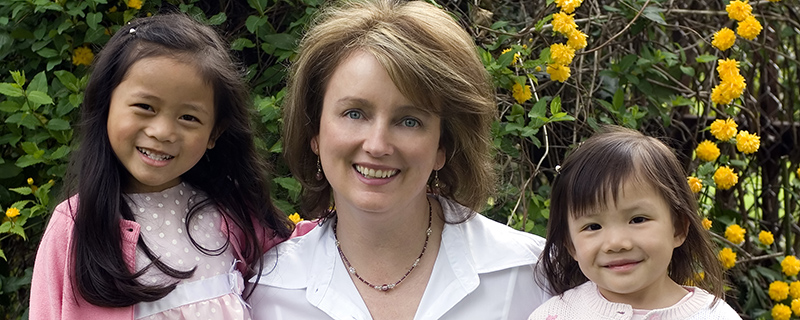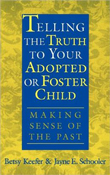
What would it be like if you were Laurie? Laurie, now 17, was adopted at the age of 3. One afternoon at a family reunion, she sat dumbfounded as her cousin told her what really happened in her past: her birth father killed her birth mother, and he was in prison. That was never the story Laurie was told. The problem was that everyone in the family knew the truth except Laurie. Why wasn’t she told the truth?
Sharing a child’s life narrative with her, especially if the story contains troubling information, is often a challenging task for adoptive and foster parents alike. In an effort to protect a child’s heart from pain, information is changed, omitted or completely ignored. However, the truth always emerges, and when it does, the lie or omission is far more painful than the truth. Sometimes parents avoid the topic because they simply don’t feel they have the skills to walk into a potentially hurtful story.
However, in parents’ roles as healing parents, they are the bridge to a child’s past. They are the ones that take the hand of a child, look into his eyes, and with gentleness and compassion, tell the truth. Throughout this section, parents will find resources and tools to help them develop confidence in sharing the truth with their adopted child.
“Adopted children will only ask the questions they feel they have the permission to ask.” It is our job as parents to create an environment where a child can freely voice questions, feelings and concerns and receive the answers and support he needs.
Jayne E. Schooler
Adoption Educator and Author
Learn More
Featured Reading
Telling the Truth to Your Adopted or Foster Child: Making Sense of the Past
 Betsy E. Keefer and Jayne E. Schooler, 2000
Betsy E. Keefer and Jayne E. Schooler, 2000
Telling a child he or she is adopted can be a trying task, but this is only the first step. After becoming aware that he or she is adopted, the child will question the details of the adoption. The truth may reveal details that are painful and sometimes traumatic: A parent is in prison, a drug addict, or even a rapist. In Telling the Truth to Your Adopted or Foster Child, Keefer and Schooler demonstrate that in even the most difficult situations, foster and adoptive parents must not withhold or distort information about the past. Though sometimes including difficult truths, communication between a caregiver or parent and foster or adopted child can help a child grow up into an emotionally and psychologically healthy adult.
AAP Lending Library
View books and DVDs on Talking about Adoption available to borrow
Online Learning
Lets Talk Adoption
Course offered by Adoption Learning Partners
Talking about adoption can be difficult for a variety of reasons, but it should not be a one-time conversation. This course gives you the tools you need to make talking about adoption part of your family’s everyday life.
Lifebooks
Course offered by Adoption Learning Partners
A Lifebook is a book created for an adopted child that tells his story, before and after adoption. It helps children place foster care or adoption in the context of their life experiences. This course will help you understand the purpose and importance of a Lifebook, identify situations in which it is beneficial and develop some pages of your child’s Lifebook.
Articles and Websites
Putting the Pieces Together: The Significance of the Child’s Story
Adoption Advocate No. 114, National Council for Adoption, December 2017
Talking With Your Children About Adoption Part A: The Basics
Center for Adoption Support and Education, 2016
Talking With Your Children About Adoption Part B: Difficult Information
Center for Adoption Support and Education, 2016
Talking With Your Children About Adoption – The Teen Years
Center for Adoption Support and Education, 2016
Talking to Adopted Children About Birth Parents and Families of Origin: How to Answer the “Hard Questions”
Adoption Advocate No. 87, National Council for Adoption, September 2015
The Whole Truth
Adoptive Families, September 2012
Associate Editor of Adoptive Families magazine, Rebecca Klein, provides guidance to parents on sharing with their child the difficult information that may be a part of their adoption story.
Adoptive Families Magazine
Several on-line articles on talking about adoption
Recommend an article or other resource
Please note: The Adoption Assistance Program (AAP) does not promote or endorse any websites, organizations or individuals that may be linked from this site. The AAP does not guarantee the accuracy of the information or the appropriateness of advice for a particular situation. It is our intent to assist users in their search for reliable and useful sources of information pertaining to adoption, legal guardianship, and parenting.